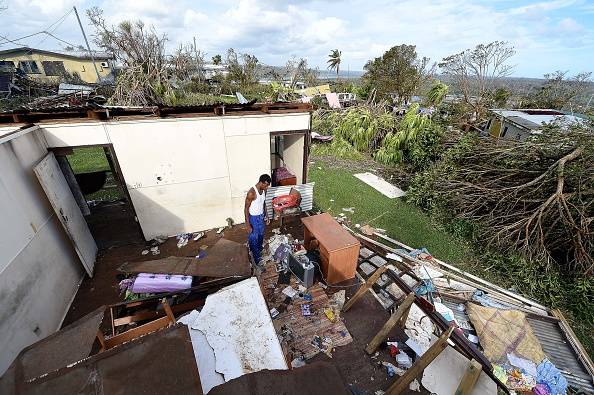
Uwen Garret surveys the destruction of his home in Port Vila, Vanuatu, on March 16, 2015. Cyclone Pam ravaged the South Pacific island with hurricane-force winds, giant waves and flash floods. (Photo: Dave Hunt Pool/Getty Images)
Over the past few weeks, heatwaves have killed more than 100 people in India.
In Africa, some countries are experiencing torrential rains while others are suffering from severe drought.
At the recent meeting of Commonwealth Health Ministers in Geneva, Switzerland, we looked together at how climate change is increasing the incidence of vector-borne infectious diseases – not only the spread of malaria but also other dangerous diseases such as the recent outbreak of dengue fever in Samoa.
Commonwealth leaders have been calling for a global effort to tackle climate change since 1989, even before there was an international negotiating process. In line with their call, climate scientists have long warned the world that global warming needs to be limited to 1.5°C to avoid dangerous tipping points that could lead to irreversible damage.
Alarmingly, we pass this important milestone in February 2024, with global temperatures exceeding 1.5°C over the past 12 months, making it the hottest year on record.
The World Meteorological Organization has warned that this record could be broken again this year, resulting in even more losses of lives and livelihoods and putting enormous pressure on national systems and services.
This pressure falls disproportionately on Small Island Developing States (SIDS).
Although SIDS occupy only 3% of the world's land area, they are of vital importance to humanity as a whole and the planet we share.
These protected areas protect 11.5% of the ocean's exclusive economic zones, including seven of the 10 coral reef hotspots and 20% of all terrestrial bird, plant and reptile species.
But climate-related deaths from extreme weather events are five times more common in SIDS, and when shocks occur, SIDS are hit hard.
Cyclones and hurricanes can knock small or fragile countries off their growth trajectory for years, even decades. In 2017, Hurricane Maria devastated my native Dominica, wiping out 225% of its GDP.
In 2019, shortly after Hurricane Dorian, the strongest hurricane in history to strike the Bahamas, struck the island nation, I visited the northern islands of Abaco and Grand Bahama. At the time, I was heartbroken to see scenes that could only be described as a war zone.
Last year, Vanuatu was devastated by Category 5 Cyclone Laura, which struck seven months after twin cyclones Judy and Kevin destroyed 50% of the country's GDP.
The damage caused by these shocks is compounded by the lack of adequate financial support.
Despite accounting for just 1% of global carbon dioxide emissions, SIDS have struggled to access climate finance: in 2019, only $1.5 billion of the $100 billion pledged to developing countries was available to SIDS.
Lacking alternatives, these countries have no choice but to seek financing on unfavourable terms, resulting in a vicious cycle of rising debt burdens, making debt unsustainable and further restricting access to finance.
The Commonwealth is home to two-thirds of the world's SIDS and this exceptional concentration of hardship is at the heart of my motivation to advocate for and support SIDS at all levels.
Small Island Developing States (SIDS) are also saying enough is enough and are leading efforts to retarget climate finance. At COP28, Commonwealth Member States SIDS were at the forefront of hard-won progress on loss and damage.
Samoa, the incoming chair of the Commonwealth of Nations, joined other small island and vulnerable countries in the Fourth International Conference on Small Island Developing States (SIDS4) in Antigua and Barbuda, where leaders called for “collective, quantified financial targets and resources” to address more frequent and intensifying natural disasters.
The Commonwealth is working to ensure that SIDS' voices are heard at the highest levels of the international system, providing practical support in key areas such as finance and disaster resilience.
The Commonwealth Climate Finance Access Hub has unlocked $330 million for our most vulnerable members, with a further $500 million worth of project proposals in the works.
Our country climate finance advisors work in close partnership with government officials in member countries: they not only prepare project proposals but also work to build government capacity to confront the challenges of climate change and development.
Over the years, we have seen leaders of these countries take the steps necessary to transition to low-carbon, climate-resilient development.
But reliable climate finance is key to scaling up this effort, and the Commonwealth Secretariat will continue to advocate for increased finance for adaptation, mitigation and resilience building – a lifeline for vulnerable countries.
Our commitment to climate change is not new, it is part of our Commonwealth’s DNA, and our history of environmental leadership continues to guide us today.
The next Commonwealth Heads of Government Meeting will be held in Samoa in October this year – the first time it will be held in a small island Pacific state – and there will be a clear focus on building the resilience that is vital to the prosperity of each of the 56 nations.
To achieve this, the world must keep its promises. Every promise on climate action and finance from world leaders is important, but failure to deliver is an insult to the most vulnerable, and inaction is an act of violence against those who depend on us to succeed, now and in future generations.
The call for action on climate finance will continue to resonate, from Commonwealth Small Island Developing States (SIDS) at the UN General Assembly in September to the COP29 negotiations in Baku in November. This call must be heeded.
Patricia Scotland KC is Secretary General of the Federation.

